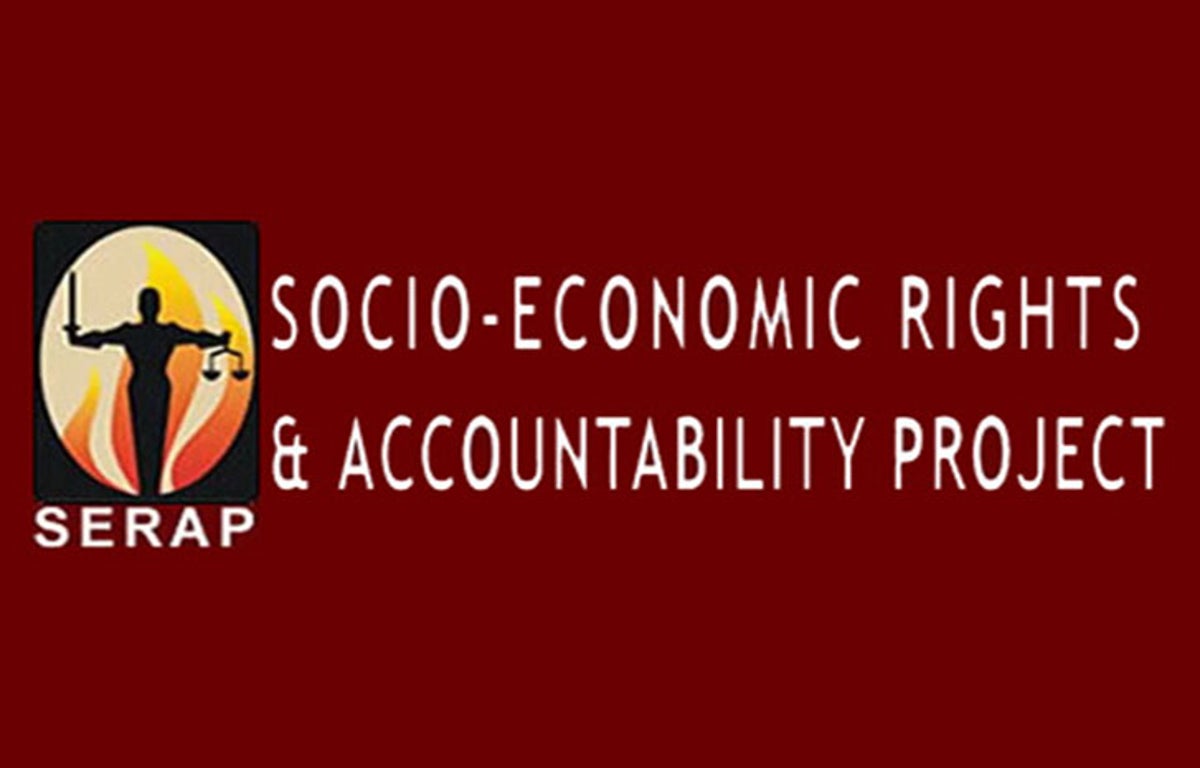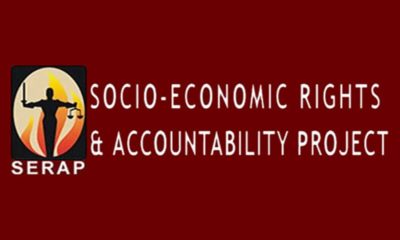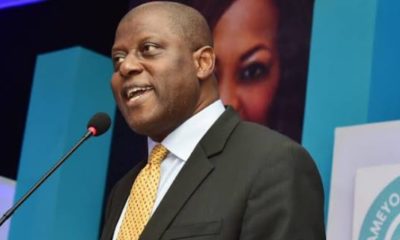Business
SERAP Drags CBN On N100bn Dirty Notes, Other Missing Public Funds

The Socio-Economic Rights and Accountability Project (SERAP) has urged the Central Bank of Nigeria (CBN), “to account for and explain the whereabouts of the over N100 billion ‘dirty and bad notes’ and ‘other large sum of cash awaiting examination’ which are kept in various branches of the CBN.”
In a statement, the SERAP pointed out that the allegations were documented in the latest annual report recently published by the Auditor-General of the Federation.
Consequently, the SERAP urged CBN governor, Olayemi Cardoso, to “explain the whereabouts of the N7.2 billion budgeted for the construction of the CBN Dutse branch in 2010 and the N4.8 billion budgeted for the renovation of the CBN Abeokuta branch in 2009, and to publish the names of the contractors who collected the money but failed to complete the projects.”
Similarly, the SERAP urged Cardoso “to explain the whereabouts of the allegedly missing outstanding loan of N1.2 billion granted to the Enugu State government in 2015 and the outstanding loan of N1.9 billion granted to the Anambra State government between 2015 and 2016 and to fully recover and remit the public funds to the treasury.”
The SERAP also urged him “to refer these grave violations of the Nigerian Constitution 1999 [as amended], the CBN Act and the country’s national and international anticorruption obligations to appropriate anticorruption agencies for investigation and prosecution, as appropriate, and the recovery of the public funds.”
These demands were detailed in the letter dated June 29, 2024 issued under the signature of Deputy Director, SERAP, Kolawole Oluwadare.
It stated, “These grim allegations by the Auditor-General suggest grave violations of the public trust, the provisions of the Nigerian Constitution, the CBN Act, and national and international anticorruption obligations.
“These grave violations also reflect a failure of CBN accountability more generally and are directly linked to the institution’s persistent failure to comply with its Act and to uphold the principles of transparency and accountability.”
It added that, “These grave violations have seriously undermined the ability of the CBN to effectively discharge its statutory functions and the public trust and confidence in the bank. The CBN ought to be committed to transparency and accountability in its operations.”
The letter, read in part, “We would be grateful if the recommended measures are taken within 7 days of the receipt and/or publication of this letter. If we have not heard from you by then, SERAP shall take all appropriate legal actions to compel you and the CBN to comply with our request in the public interest.
“Explaining the whereabouts of the missing public funds, publishing the names of those suspected to be responsible and ensuring that they are brought to justice and the full recovery of any missing public funds would serve the public interest and end the impunity of perpetrators.
“According to the recently published 2020 audited report by the Auditor General of the Federation (AGF), the Central Bank of Nigeria (CBN) has since 2017 been keeping over N100 billion [N100,672,999,000.00] ‘dirty and bad notes’, and other large sum of cash awaiting examination in various branches of the CBN.
The Auditor-General fears that the ‘dirty and bad notes’ initially planned to be destroyed may have been ‘be diverted and re-injected into the economy.’
“The CBN in August 2010 also reportedly budgeted N7.2 billion [N7,286,500,476.76] for the construction of Dutse branch building. The Dutse branch was due to be completed in November 2012 but the contractors have failed to complete the project.
“The Auditor-General is concerned that the project may have been ‘awarded to incompetent contractor,’ and wants the ‘job completed without further delay.’
“The CBN in 2009 reportedly budgeted N4.8 billion [N4,812,608,028.10] for the renovation of the CBN Abeokuta branch. The Abeokuta branch was due to be completed in 2012 but the contractors have failed to complete the project.
“There is no significant renovation work on the site, several years after the proposed completion date. The Auditor-General is concerned that the project may have been ‘awarded to incompetent contractor,’ and wants the ‘job completed without further delay.’
“The CBN also reportedly failed to account for the missing outstanding loan of N1.2 billion [N1,294,453,887.83] granted to the Enugu state government in 2015 and the outstanding loan of N1.9 billion [N1,994,383,561.64] granted to the Anambra state government between 2015 and 2016.
“The Auditor-General fears the public funds may have been diverted. He wants the money fully recovered and remitted to the treasury.
“Paragraph 708 of the Financial Regulations 2009 provides that, ‘on no account should payment be made for services not yet performed or for goods not yet supplied.’
“Section 35(2) of the Public Procurement Act 2007 provides that, ‘once a mobilization fee has been paid to any supplier or contractor, no further payment shall be made to the supplier or contractor without an interim performance certificate.
“Section 16(6) of the Public Procurement Act states that ‘all bidders shall possess the necessary professional and technical qualifications to carry out particular procurements; the financial capacity and adequate personnel to perform the obligations of the procurement contracts.’
“SERAP notes that Section 15(5) of the Nigerian Constitution requires public institutions to abolish all corrupt practices and abuse of power.” Section 13 of the Constitution imposes clear responsibility on the CBN to conform to, observe and apply the provisions of Chapter 2 of the constitution.
“Paragraph 3112(ii) of the Financial Regulations 2009 provides that, “Where a public officer fails to account for government revenue, such officer shall be surcharged for the full amount involved and such officer shall be handled over to either the Economic and Financial Crimes Commission (EFCC) or the Independent Corrupt Practices and Other Related Offences Commission (ICPC).”
“Nigeria has made legally binding commitments under the UN Convention against Corruption to ensure accountability in the management of public resources. Articles 5 and 9 of the UN Convention against Corruption also impose legal obligations on the CBN to ensure proper management of public affairs and public funds.
“Nigerians have the right to know the whereabouts of the public funds. Taking the recommended measures would advance the right of Nigerians to restitution, compensation and guarantee of non-repetition.
“The Nigerian Constitution, Freedom of Information Act, and the country’s anti-corruption and human rights obligations rest on the principle that citizens should have access to information regarding their public institutions’ activities.”
Business
Savannah Energy Provides Unaudited FY 2024 Trading Updates

Savannah Energy has shared a trading update on its Nigerian operations and other markets in Africa, including up-to-date cash collections in its Nigerian business.
According to the update, made available on Thursday in Lagos, its gross production in Nigeria averaged 23.1 Kboepd for FY 2024, broadly in line with the prior year’s 23.6 Kboepd, of which 88% was gas (FY 2023: 91%).
On the update, CEO of Savannah Energy, Andrew Knott, said, “I am pleased to provide a FY trading update which demonstrates the continued progress we have made in 2024, a year which saw the highest level of cash collections ever recorded by our Nigerian business. 2025 is expected to be an exciting year for our Company: we have a large planned operational programme in Nigeria which is anticipated to enhance both our oil and gas production levels and capacity; we intend to progress our R3 East oil development project in Niger; we continue to pursue key acquisitions in the upstream oil and gas space; and we continue to seek to build our power business.
“Fundamentally, Savannah remains unequivocally an “AND” company, seeking to deliver strong performance both for the short AND long term across multiple fronts, and pursuing growth opportunities in both the hydrocarbon AND power sectors.”
The update It also shows that it generated a Total Income of US$393.6 million in 2024, compared to FY 2023’s US$289.8 million. This consists of Total Revenues of US$258.7 million and Other operating income of US$134.9 million.
The report also shows that Savannah’s FY 2024 Total Revenues were ahead of the previously issued financial guidance of greater than US$245 million, while FY 2024 financial guidance is reiterated for Operating expenses plus administrative expenses at ‘up to US$75 million’. The company expects its FY 2024 capital expenditure to come in lower than planned (previously guided at ‘up to US$50 million’) due to the phasing of spend.
ALSO READ: CSR: Dangote Awards Scholarships To 473 Students
According to the update, Savannah’s cash collections in 2024 amounted to US$248.5 million, a slight increase from the US$206 million it received in 2023. The report further shows that its cash balances as at 31 December 2024 stood at US$32.6 million, compared to the 31 December 2023 figure of US$107.0 million.
The report shows that the company’s midstream subsidiary, Accugas Limited, had as at 31 December 2024 drawn down on its NGN332 billion of the NGN Transitional Facility, with the resulting funds being converted to US$, which, along with cash held, was used to partially prepay the existing Accugas US$ Facility, leaving a balance as at 31 December 2024 of approximately US$212.3 million.
The report also provided new updates on Accugas’ US$45 million Uquo Central Processing Facility (“Uquo CPF”) compression project in Nigeria, noting that its commissioning which will enable the expansion of gas production in the medium term is well underway.
The report highlighted the progress being made in the procurement process of long lead equipment in Nigeria for a potential two-well drilling campaign on the Uquo Field in H2 2025, with an additional gas development well expected to add up to 80 MMscfpd of supplemental production capacity and a potential exploration well targeting an Unrisked Gross gas initially in place (“GIIP”) of 154 Bscf (25.7 MMboe) of incremental gas resources.
The update shows that progress is also being made in the planned Savannah acquisition of Sinopec International Petroleum Exploration and Production Company Nigeria Limited, whose principal asset is a 49% non-operated interest in the Stubb Creek oil and gas field (“Stubb Creek”), with regulatory approval and completion being targeted in Q1 2025. Following the completion of the acquisition, Savannah intends to commence an expansion programme which is anticipated to increase Stubb Creek gross production from an average of 2.7 Kbopd in 2024 to approximately 4.7 Kbopd.
In Niger, Savannah continues to seek to progress its 35 MMstb (Gross 2C Resources) R3 East oil development in South-East Niger, while it continues to push for a potential alternative transaction structure to acquire a material stake in producing oil and gas assets in South Sudan as previously announced on 20 December 2024.
On the renewable energy front, the update shows that Savannah has up to 696 MW of renewable energy projects currently in motion, including the up to 250 MW Parc Eolien de la Tarka wind farm project in Niger and the up to 95 MW Bini a Warak hybrid hydroelectric and solar project in Cameroon. A firm believer in Africa’s transition to renewable energy, Savannah continues to target a portfolio of up to 2 GW+ of power projects in motion by the end of 2026.
Business
Nigeria Can Achieve 5.5% GDP Growth – NESG
The Nigerian Economic Summit Group (NESG) has projected that the country has the potential to achieve a 5.5% growth in Gross Domestic Product (GDP) if critical policy reforms are sustained.
This was disclosed on Thursday during the launch of the NESG’s 2025 Macroeconomic Outlook report.
Speaking at the event, the Chief Economist and Director of Research & Development at NESG, Dr. Olusegun Omisakin, highlighted the need for more efficient policy implementation to unlock Nigeria’s economic potential.
READ MORE: Davido Is Richer Than His Billionaire Father – Ibrahim Chatta Claims
“We believe at the optimal level, if we embark on more efficient policy reforms, the Nigerian economy has the potential, the GDP to end up at 5.5 per cent, and we believe that this is achievable,” Omisakin stated.
More to follow……….
Business
CBN Approves Release Of Nigerian FX Code
The Central Bank of Nigeria (CBN) has announced the release of the Nigerian Foreign Exchange (FX) Code, a set of guidelines designed to promote ethical conduct among authorized dealers in the country’s FX market.
In a statement, the apex bank disclosed that the official launch of the Code would take place on Tuesday, January 28, 2025, at the CBN Head Office Auditorium in Abuja.
READ MORE: Dangote Denies Culpability In Pumping Up Petrol Price
“The Central Bank of Nigeria has approved the release of the Nigerian Foreign Exchange (FX) Code as a guideline to the banking industry to promote the ethical conduct of authorised dealers in the Nigerian Foreign Exchange Market,” the statement read.
The introduction of the FX Code is expected to enhance transparency, accountability, and professionalism within Nigeria’s foreign exchange ecosystem, aligning it with global best practices.
The event is anticipated to attract key stakeholders in the financial and banking sectors, as well as representatives from authorized FX-dealing institutions across the country.























